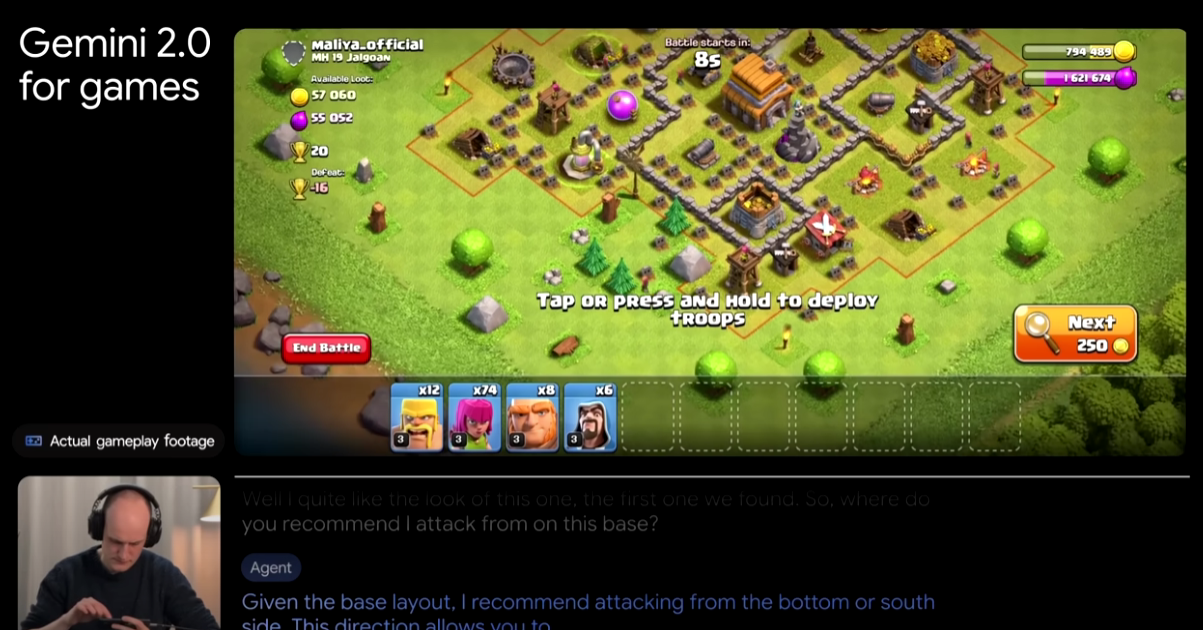Experience the future of AI as Google’s Gemini 2.0 redefines human-agent interaction with faster performance, real-time collaboration, and groundbreaking tools for everyday life.

Image Credit: Google DeepMind
A recent article published on Google's "The Keyword" website described Gemini 2.0, an advanced multimodal artificial intelligence (AI) model designed for the agentic era. It improved reasoning, multimodal input/output, and tool usage. It supported tasks like research assistance, real-time multimodal interactions, and advanced AI agents such as Project Astra and Mariner. This launch marks a transformative shift in AI's ability to anticipate, reason, and act under human supervision, a cornerstone of the agentic era. Gemini 2.0 Flash enhanced speed and functionality, enabling developers and users to explore its capabilities. The article highlighted Google's focus on safety, with extensive testing and risk assessments.
Related Work
Google's past AI work showcased Gemini 1.0 and 1.5 as pioneering multimodal models that advanced understanding of text, video, images, audio, and code. These models supported long-context processing, reimagined key products, and empowered developers. Efforts in 2023 focused on building agentic models capable of advanced reasoning, proactive action, and multimodal outputs. Gemini 2.0 represented a leap forward, integrating these innovations to enable advanced AI agents and enhanced tools like deep research and AI overviews. These advancements are part of Google’s broader goal to create universal AI assistants capable of handling increasingly complex tasks.
Gemini 2.0 Innovations
Gemini 2.0 Flash builds on the success of its predecessor, 1.5 Flash. It offers enhanced performance at twice the speed while outperforming 1.5 Pro on key benchmarks. It introduces new capabilities, including multimodal outputs like natively generated images with text and multilingual, steerable text-to-speech. Additionally, it supports tools such as Google Search, code execution, and user-defined functions, making it a robust choice for developers. The model’s real-time audio and video streaming capabilities through the Multimodal Live API allow for the development of dynamic, interactive applications.
The experimental model is available through the Gemini application programming interface (API) in Google AI Studio and Vertex AI. This API enables early-access partners to utilize advanced features such as text-to-speech and native image generation. A new multimodal live API has also been introduced to allow real-time audio and video streaming inputs for building interactive applications. General availability is planned for January.
Gemini 2.0 Flash paves the way for more agentic AI experiences with capabilities such as multimodal reasoning, long-context understanding, and native tool use. These capabilities enable applications like Project Astra, Project Mariner, and Jules. These prototypes showcase AI's ability to integrate seamlessly into daily activities, from research assistance to browser navigation and task execution. While still in the early stages, these developments promise to unlock practical applications of AI agents, helping users and developers achieve their goals efficiently. Trusted testers are exploring these features to shape their integration into future Google products.
Advancing AI Assistance
Project Astra, introduced at input/output, has evolved with feedback from trusted testers using it on Android phones, providing insights into the practical applications of a universal AI assistant while addressing safety and ethical considerations. Built with Gemini 2.0, the latest version includes significant improvements, such as enhanced dialogue capabilities supporting multiple and mixed languages with a better understanding of accents and uncommon words.
The agent now utilizes tools like Google Search, Lens, and Maps, making it more effective in assisting with everyday tasks. Additionally, Project Astra features enhanced memory, enabling up to 10 minutes of in-session memory and the ability to recall previous interactions, offering a more personalized user experience. Privacy safeguards, including session deletion and user-controlled memory management, ensure that these advancements are implemented responsibly.
Further advancements include improved latency, thanks to streaming capabilities and native audio understanding, enabling near-human conversational responsiveness. Google is working to extend these features to products like the Gemini app and new form factors, including prototype glasses. The trusted tester program is expanding to evaluate these features in novel applications, including real-world use cases for wearable AI.
Revolutionizing Browser Navigation
Project Mariner, a research prototype built with Gemini 2.0, explores human-agent interaction through a browser-based interface. It understands and reasons across elements on the browser screen, including text, code, images, and forms, using an experimental Chrome extension to complete tasks. The agent prioritizes user instructions over third-party attempts to manipulate prompts, ensuring secure and reliable operation.
When tested against the WebVoyager benchmark, it achieved a state-of-the-art result of 83.5%. Although still in the early stages, the project demonstrates the potential for browser navigation, with improvements expected over time. Project Mariner only interacts with the active tab to ensure safety and seeks user confirmation for sensitive actions. Trusted testers are currently evaluating the prototype.
AI Agents Development
Jules, an experimental AI-powered code agent integrated into GitHub, assists developers by tackling issues, developing plans, and executing tasks under their supervision. Google DeepMind is also exploring AI agents in games, such as those powered by Gemini 2.0, to help users navigate virtual worlds and provide real-time suggestions. This effort expands to robotics, where Gemini 2.0’s spatial reasoning capabilities are being tested for physical-world applications.
Additionally, Gemini 2.0’s spatial reasoning capabilities are being tested for robotics, with potential applications in the physical world. To ensure responsible development, Google conducts extensive safety research, works with trusted testers, and uses red-teaming techniques to mitigate risks while improving model security.
Conclusion
In summary, Gemini 2.0 marked a significant advancement in AI, introducing multimodal capabilities and agentic models that could understand and perform tasks with human supervision. The new Flash model demonstrated enhanced performance, while prototypes like Project Astra and Mariner explored AI’s potential in real-world applications. By prioritizing safety, ethical development, and continuous research, Google is setting a new standard for AI innovation and its integration into diverse domains.
Introducing Gemini 2.0 | Our most capable AI model yet